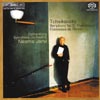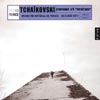Tchaikovsky Symphony No 6
A detached Järvi fails to touch the heart; by contrast, Muti’s Pathétique is searing
View record and artist detailsRecord and Artist Details
Composer or Director: Pyotr Ilyich Tchaikovsky
Genre:
Orchestral
Label: BIS
Magazine Review Date: 13/2004
Media Format: Super Audio CD
Media Runtime: 69
Mastering:
Stereo
Catalogue Number: BIS-SACD1348

Tracks:
| Composition | Artist Credit |
|---|---|
| Symphony No. 6, 'Pathétique' |
Pyotr Ilyich Tchaikovsky, Composer
Gothenburg Symphony Orchestra Neeme Järvi, Conductor Pyotr Ilyich Tchaikovsky, Composer |
| Francesca da Rimini |
Pyotr Ilyich Tchaikovsky, Composer
Gothenburg Symphony Orchestra Neeme Järvi, Conductor Pyotr Ilyich Tchaikovsky, Composer |
Composer or Director: Pyotr Ilyich Tchaikovsky
Genre:
Orchestral
Label: Astrée Naïve
Magazine Review Date: 13/2004
Media Format: CD or Download
Media Runtime: 50
Mastering:
Stereo
DDD
Catalogue Number: V4970

Tracks:
| Composition | Artist Credit |
|---|---|
| Symphony No. 6, 'Pathétique' |
Pyotr Ilyich Tchaikovsky, Composer
French National Orchestra Pyotr Ilyich Tchaikovsky, Composer Riccardo Muti, Conductor, Bass |
Author: Edward Seckerson
I can’t remember hearing a more disappointing, a more uninvolving Järvi performance. Or I should say performances, because the coupling – Francesca da Rimini – is, frankly, even worse. A hurricane downgraded to a summer storm. Muti, by contrast, offers only the Pathétique (short measure by any standards) but doesn’t leave you wanting more. A potent, atmospheric Pathétique is a meal in itself and Muti’s account is certainly well-seasoned. The differences – and they are dramatic – are apparent right from the start. Järvi’s double basses are a true pianissimo, the pause bars are made to tell. But what do they tell? With Muti we get the unspoken – literally. A terrible presentiment. And it’s all down to subtext. With Järvi, too much of the story beyond the notes goes untold.
Sometimes it’s just a question of musicality. How untypical of Järvi, for instance, to make so little of the transition into the famous second subject of the first movement. Tchaikovsky does all the groundwork with a fragile ppp left suspended and expectant in the violins. Muti makes it magical, breathtaking (despite the best efforts of Parisian coughers) but Järvi makes nothing at all of it so that the arrival of that heart-easing melody is anything but.
Moving on, Muti’s engineers almost wreck dynamic contrast for him at the onset of the development – the bolt-from-the-blue moment: ppppp to fff in a nanosecond. I still think Tchaikovsky miscalculated switching from solo clarinet to bassoon for that chilling descent to nothingness. Those who substitute bass clarinet – and neither Järvi or Muti do – do so with justification. That said (and you would not be buying Muti for the sound; Jarvi’s studio engineering is infinitely superior) this blistering development really sets the two performances apart. Järvi keeps his head, Tchaikovsky doesn’t. It’s that simple. Muti’s intensity is febrile, discomforting. A tremendous timpani crescendo spills over into the largamente at the climax and you really feel as well as hear Tchaikovsky’s marking for the violins – forte possible – made good.
And so it goes on. Järvi even falls into the old trap of making the second movement’s allegro con grazia sound too much of a diversion – as if it belongs to another symphony. Muti’s initial air of nonchalance belies the underlying and ever-growing disquiet. It’s all in the characterisation. Muti’s operatic nature pays off. Collectors of live events will want to hear him. For the rest of us, there’s Mravinsky, there’s Markevitch, and there’s still the classic Fricsay/Berlin Philharmonic interpretation (the first I possessed) which hasn’t paled over all the years.
Discover the world's largest classical music catalogue with Presto Music.

Gramophone Digital Club
- Digital Edition
- Digital Archive
- Reviews Database
- Full website access
From £8.75 / month
Subscribe
Gramophone Full Club
- Print Edition
- Digital Edition
- Digital Archive
- Reviews Database
- Full website access
From £11.00 / month
Subscribe
If you are a library, university or other organisation that would be interested in an institutional subscription to Gramophone please click here for further information.




